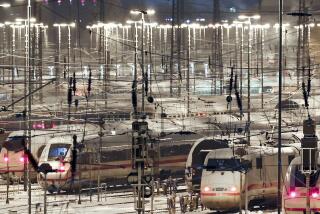Volkswagen Struggles Through Slump : Economy: Postwar Germany’s worst recession has forced the giant auto builder to make many wrenching decisions.
- Share via
WOLFSBURG, Germany — Every 16 seconds, a new car zips off the assembly lines at Volkswagen’s huge headquarters factory in this northern German city.
But that blinding speed hasn’t been enough to spare Volkswagen the need to make wrenching changes affecting its corporate culture and the lives of the 51,000 people behind the auto maker’s shiny products here.
They numbered 65,000 only a few years ago.
VW has trimmed staff but says the number is still too high. To avoid more job cuts, Europe’s biggest auto maker and its union have agreed to shorten the workweek and reduce annual pay by about 10%.
“It was a big surprise to take such a big cut. I never thought it was possible,” said Heinz Mutzick, a 33-year factory veteran who brings home about $1,750 a month.
The pay cut really hasn’t hit yet. The lower pay will come in the form of reduced bonuses, so the ax will fall in June when workers won’t get the extra month’s pay they’re used to.
VW workers are dialing back vacation plans and reducing their savings and other expenses to compensate for the lower income.
Joerg Wolter figured he might have been laid off, even after 16 years on the assembly line. So he was happy to take a pay cut instead. Part of his personal defense, however, will hurt VW’s sales. Wolter had bought a new VW every year at a discount. Now he’ll wait.
Similar things are happening around Germany as the nation creeps out of its worst recession since World War II and many companies deal with tough competition from countries where workers are paid less.
Expectations of climbing wages are kaput. Last year, average wages in western Germany grew 3.8%, while inflation was 4.2%.
Volkswagen AG, which lost a whopping 1.94 billion marks, or $1.13 billion, last year, has made one of the most radical changes of any German company.
The government reacted angrily when VW said it would go to a four-day workweek to avoid laying off 30,000 of its 100,000 workers in Germany. Chancellor Helmut Kohl said Germans need to work more hours, not fewer, to regain competitiveness.
The promised four-day week has turned out to be a five-day week with shifts of five hours and 46 minutes for many assembly-line workers. But VW management is certain it made the right move.
“We wanted to find a typical VW solution,” said Guenther Koch, a personnel executive. “If we thought we wouldn’t remain No. 1 in Europe, we would have let a lot of people go.”
The advantage of the short workweek, Koch said, is to keep skilled people, “get over the hump” and move back to longer shifts in 1996.
Koch’s negotiating adversary, Bernd Osterloh, head of shop stewards for the IG Metall metalworkers union, said it was an “intelligent solution” in comparison with Daimler-Benz AG’s laying off of 50,000.
He said the shortened VW workweek also was better than the solution at General Motors Corp. subsidiary Opel, which agreed last year with its union to cut bonuses and trim pay increases.
“They’re working 36 hours but getting less pay,” Osterloh said, while VW’s move showed “good solidarity.”
Solidarity and loyalty run through the VW factory and the city of Wolfsburg, which was created from scratch in 1938. After World War II, the best-selling VW Beetle was built in Wolfsburg and the state-owned company was largely privatized, though the state of Lower Saxony still holds 20% of the shares.
The concept of worker loyalty extends beyond the factory to German society as well.
Mutzick, the veteran factory hand, said the world suffered terribly from the 1930s mass unemployment that helped bring on the Nazi government. Today’s VW solution can provide an example for the nation, he said.
Friedhelm Schofeld, one of thousands who took early retirement in recent years as VW was trimming its work force, said Volkswagen acted humanely following his 32 years’ employment--and was still doing so with the reduced workweek.
But he is unsure of the future. “There won’t ever be another boom and I won’t be surprised if there have to be more cutbacks.”
The new shifts for a 28.8-hour workweek went into effect after the Easter factory shutdown. Life is not the same in Wolfsburg.
“The pulse of the factory sets the pulse of public life,” said Koch, the personnel executive.






